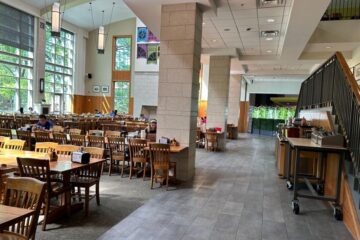jacoblund via iStockphoto
By Nathan Park
The September U.S. Jobs Report was recently released on Oct. 6 by the U.S. Bureau of Labor Statistics and it blew expectations out of the water. It reported a whopping increase of 336,000 in the U.S. Job Report Non-Farm payroll, which was far above the Dow Jones consensus estimate of 170,000 and was the biggest increase since January. Regarding the different sectors in which these jobs have been added into, jobs in leisure and hospitality rose by 96,000, jobs in government by 73,000, and jobs in health care by 41,000 (compared with the average monthly gain of 53,000 over the prior 12 months). In addition, the unemployment rate remained stable at 3.8% with no sign of a wage spiral, a situation in which rising wages increase prices, as the average hourly earnings came in weaker over the month at 0.2% versus the expected 0.3%.
Considering all of these figures, what implications does this hold for me, a university student seeking employment within the current economic climate? To address this query, it is pertinent to initially delve into a discussion about the state of the economy.
There is no sign of the economy slowing down anytime soon, as the September report marked 33 consecutive months of job growth.
In the few weeks leading up to this report, there had been conflicting news about the exact state of the market and the direction it was headed in. With this report, it’s evident that the market is continuing to stay hot. There is no sign of the economy slowing down anytime soon, as the September report marked 33 consecutive months of job growth. Although this does sound like great news for the economy, there are other factors we need to consider as well. The persistence of inflation is a significant factor we have to think about. Prices continue to increase at a rate that exceeds expectations. Although the current annual price increases aren’t as alarming as when inflation surpassed 9% last year, they still hover above 3%, a level deemed unhealthy by many economists.
Where does the Fed currently stand?
According to CNN, with gas prices averaging at $3.75 (surpassing $4 in numerous locations nationwide), mortgage rates surpassing 7% (reaching a 23-year peak), and the resumption of student loan payments for millions of Americans, a thriving job market won’t convince most people that the economy is robust. In fact, the strong job market might make Americans feel worse. The Federal Reserve has been working toward tempering economic growth and moderating the pace of expansion in the labor market with plans to raise interest rates, the only counter against inflation. With such a persistently strong job market, this implies that the Federal Reserve could continue raising rates without the apprehension of triggering a recession. However, there are also claims that the Federal Reserve may be done with raising the interest rate. According to USA Today, Ian Shepherdson, the Chief Economist of Pantheon Macroeconomics (an economic research consultancy), stated that the Federal Reserve is paying more attention to the unemployment rate rather than the overall increase in employment. He noted that the unemployment rate has experienced a significant increase in recent months as a greater number of individuals enter a flourishing job market. This expanded labor pool is expected to facilitate a decrease in wage growth and inflation, as employers will not need to fiercely vie for employees.
We find ourselves in a quandary where ‘good news is bad news.’
Additionally, as per CNN, Jamie Dimon, CEO of JPMorgan, reiterated his concern that rates could climb to 7%. Anticipating an increase in rates could have a significant effect on student loan rates, which have already been on the rise with a report released by Business Insider showing that in the first week of November the overall average rate for new undergraduate variable student loans of 10.71%, with an overage low rate of 6.23% and average high rate of 15.18%. While we should never celebrate a weak job market, a job market that remains robust for an extended period isn’t necessarily good news either for average Americans struggling to meet their financial obligations. Consequently, we find ourselves in a quandary where “good news is bad news,” fostering the perception among most people that the US economy is in a precarious state.
What’s the verdict for college students?
The U.S. economy is in a confusing state at the moment and for college students, it’s even more confusing. On the surface, it looks like a great time for anybody to get a job as soon as they graduate high school with the, again, booming increase in job growth; however, multiple articles from WSJ and NY Times, as well as personal testimonials from students have shown the panic college students have been facing as they scramble to find jobs. Although we cannot say for sure why this is happening, it may be due to the fear of a U.S. recession in the near future that is causing employers to be cautious in hiring their next employees. As companies brace for a recession, they need to make sure they don’t make the mistake of hiring too many employees that could then become detrimental to their company’s future, which may be the explanation for why it is so hard for college students to find a job these days.
Personally, as a freshman college student myself, hearing all this talk from upperclassmen as well as reading news articles about how difficult it is to get a job right now makes me anxious and nervous about my future. I know many students have worked very hard to get into a college like Vanderbilt, so it is disheartening when you realize that even at a school like Vanderbilt, students are still struggling to get jobs after graduation due to the current state of the economy. Despite this, speaking to upperclassmen has also given me a lot of hope because many of them were able to overcome this obstacle through perseverance – whether that be cold-emailing as many people as they could, applying to dozens of jobs on LinkedIn, or speaking to family and friends that they know – and were then able to get the jobs they wanted. At the end of the day, I believe it will work out because, based on my interactions, it always seems to do so. Asking for help and advice from older students or mentors is something that I encourage those who may be reading this article to do. Don’t be afraid to talk to an upperclassman you may have just met in class, because they are always willing to help and I can attest to that based on my experience.




